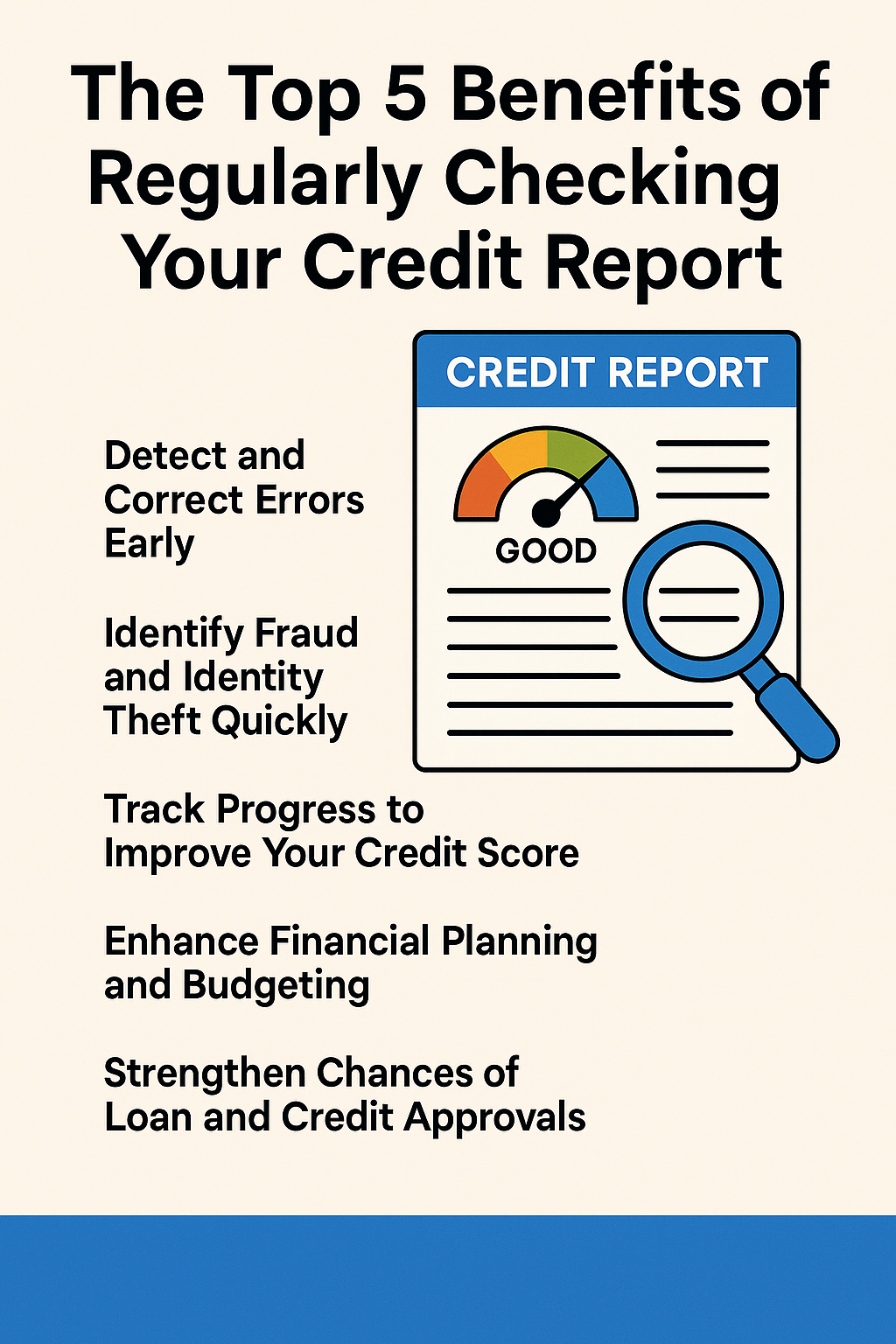Checking your credit report often is one of the best and least used ways to keep your money safe and make it better. Your credit report has everything you need to know about your credit history. Three of the biggest credit bureaus, Equifax, Experian, and TransUnion, put it together. It shows your credit accounts, payment history, unpaid debts, inquiries, and public records. You should read this report at least once every three months to see how your money is doing, find and fix mistakes, catch fraud early, and get better loan terms.
Now, let’s talk more about the five most important reasons why you should check your credit report often. We give you helpful tips, real-life examples, and expert advice to help you handle your money.
Introduction
In today’s economy, your credit score can affect everything from the interest rates you can get on loans to whether you can rent an apartment or get a job. If you have a late payment that wasn’t reported correctly or an inquiry you didn’t know about, your credit score could go down by dozens of points. Sadly, research shows that one in five people has an error on at least one of their credit reports, and nearly 5% of people have errors that are bad enough to hurt their credit scores[^1].
Checking your credit report often can help you avoid identity theft, fix mistakes before they become big problems, and make smart decisions that will help your credit over time. Lenders also like things to be simple and clear. Checking your credit often can help you get a loan more quickly.
This article goes into great detail about the top five benefits of this important financial habit and gives you helpful advice on how to make checking your credit report a regular part of your finances.
1. Find mistakes and fix them right away. Why it matters
If you make even small mistakes, like giving the wrong information about yourself or reporting a payment wrong, your credit score can go down a lot. Your score could go down if your address doesn’t match or if your account is mistakenly marked as delinquent. This could mean that you have to pay more interest or that you can’t get a loan.
How Regular Checks Help: Right Now Find mistakes right away; if you wait months, they will only get worse.
- Timely Dispute: The Fair Credit Reporting Act (FCRA) says that after a bureau gets a dispute, they have 30 days to look into it[^2]. The sooner you find out about something, the sooner you can fix it.
- How to Protect Your Credit Score and Your Financial Reputation: Fixing a mistake that would have stayed on your report for years protects your credit score and your reputation as a good money manager.
- Check your work to make sure that all of your personal information, like your name, address, and Social Security number, as well as your account statuses and inquiry lists, are correct.
Sarah saw that a credit card she had never used was “60 days past due.” She went to the credit bureau’s website to file a complaint, and they took down the wrong entry in less than three weeks. This made her credit score go up by about 30 points.
2. Quickly Find Fraud and Identity Theft
The Danger That Is Getting Worse
If someone uses your name, Social Security number, and account numbers to open fake accounts, they might be stealing your identity. The FTC says that fraud-related identity theft rose by 65% between 2012 and 2022[^3].
How keeping an eye on things lowers risk: A lot of new accounts that you didn’t open are a big sign that something is wrong.
- It could be a sign of fraud if lenders you never talked to make hard inquiries.
- Timely Alerts: The sooner you notice something strange, the sooner you can call the police or the FTC and freeze your accounts to report identity theft.
Carlos got a hard inquiry from an auto lender he hadn’t spoken to since a routine check. He told Equifax right away, froze his credit file, and stopped getting fake credit lines worth more than $5,000.
3. Check your progress to see if your credit score goes up.
What Helps Your Score Go Up
Your credit score can be affected by a lot of things. These are your payment history (35%), the amount you owe (30%), the length of your credit history (15%), new credit (10%), and the mix of your credit (10%) [4].
Regular reviews are good because they make sure that payments are made on time and correctly.
- Watch your debt reduction: Paying off debts lowers your credit utilization ratio.
- Strategic Credit Management: Know when to ask for higher credit limits or close old accounts.
Tip: If you want to get the best score, keep your credit utilization (the ratio of your card balances to your limits) under 30%. Even better, keep it under 10%.
4. Find out how to better plan and budget your money
Seeing the Big Picture
Your credit report shows all of your credit accounts, including their balances, limits, and whether or not you are making payments on time. This picture is very useful for:
- Making plans for how to pay off your debts is what budgeting is all about.
- When you set goals, you choose which bills to pay off first.
- To keep your cash flow under control, you need to be ready for big bills, like car loan payments, that are coming up.
- Check-Ins Every Month: Make sure that you pay your bills and review your reports on the same day.
- Debt-Snowball or Avalanche: Use the report data to put accounts with low balances (snowball) or high-interest debt (avalanche) at the top of the list.
- Credit Counseling: A licensed counselor can help you in a way that works for you after you give them your report.
5. Make it easier for you to get loans and credit
From the Lenders’ Point of View
Lenders order credit reports and scores to see how risky a loan is when they look at loan applications. People who keep their records neat and clean like:
- Lower APRs, which means lower interest rates, are what better scores mean.
- More Likely to Get Approved: Lenders are less worried when a borrower doesn’t use a lot of credit and has a good payment history.
- Access to high-end items, such as credit cards with rewards and unique loan offers.
- How Regular Monitoring Helps: Find and fix any problems that could stop applications from going through before they do.
- Documentation: If you find a mistake and fix it, write down what you don’t agree with so that the lenders can see it.
- Trust: Make sure you know exactly how much credit you have before you start talking about money.
More advice on how to make the most of checking your credit report
Use official channels to get reports for free:
- The FTC says that you can get one free report from each bureau every year at AnnualCreditReport.com[^2].
- You could ask for things every four months so you can keep an eye on them all year.
Be careful with services that charge for monitoring:
- For a fee, many banks and credit services will send you alerts in real time. Check out the pros and cons.
- Learn the rules for signing up and canceling.
Change the kinds of credit you have:
- If it makes sense, add installment loans to your profile in a smart way. You pay these back over time.
- Having a good mix of credit cards, installment loans, and a mortgage can help your credit scores.
Don’t close your old accounts:
- Closing old accounts lowers your average credit age, which can hurt your score.
- If you’re worried about cards you don’t use, you might want to keep cards with low limits or no balance.
Keep up with any changes to the rules:
- At the federal level, the rules for credit reporting change from time to time.
- The Consumer Financial Protection Bureau has information about new ways to score credit and changes to the FCRA.
That’s all
Checking your credit report often is a free and smart way to keep your money in good shape. You can save money over time by making smart financial choices, like finding mistakes, stopping fraud, keeping track of how much your score has gone up, improving your budgeting, and making yourself look better to lenders.
Check your credit report every three months. Stay up to date on how credit reporting works and use both free and paid tools wisely. You should look at your credit report the same way you would your resume.
Questions and Answers That People Ask a Lot
1. How often should I check my credit report? You should look at your credit report from all three major bureaus—Equifax, Experian, and TransUnion—at least once a year. AnnualCreditReport.com is where you can do this. You might want to do these checks over the course of four months to keep an eye on things and make them safer.
2. Will checking my own credit report hurt my score? No. A soft inquiry is when you check your own report. It doesn’t change your credit score. Your score can only go down for a short time when a lender checks your credit (hard inquiries).
3. What should I do if I find a mistake on my credit report?
- Get your papers in order: statements that have the right information.
- You can also start a dispute by writing a certified letter to the credit bureau.
- The FCRA says that the bureau has 30 days to look into the matter and get back to you.
- You can file a complaint with the Consumer Financial Protection Bureau or your state’s Attorney General’s office if you still haven’t heard anything.
4. Is it safe to use free credit monitoring services? Credit card issuer alerts and other free services can help you keep an eye on things, but they usually only give you Experian data or a small number of alert types. Before you sign up for a paid service, look at its features and prices to make sure you have full control.
5. Can I get my credit report more than once a year? Yes. During the COVID-19 pandemic, the big credit bureaus let people look at their reports for free once a week on AnnualCreditReport.com. People can now go in once a year again because of this policy. Some states need more free reports. Learn what your state’s laws say about credit reporting.
6. How long do bad things stay on my credit report?
- If you don’t pay on time, it will stay on your record for seven years after the due date.
- After the first missed payment, you have 180 days and 7 years to pay off collection accounts.
- A Chapter 7 bankruptcy lasts for 10 years, and a Chapter 13 bankruptcy lasts for 7 years.
- Hard inquiries stay on your record for two years, but they only hurt your score for one year.
7. Will checking my report help me raise my credit score? Yes, in a way. You can stop problems that could hurt your score and make specific improvements by finding and fixing mistakes, spotting fraud, and keeping an eye on how the system is used.
References
- Federal Trade Commission. “Disputing Credit Report Errors.” AnnualCreditReport.com, https://www.annualcreditreport.com/index.action
- Consumer Financial Protection Bureau. “Your Rights Under the FCRA.” https://www.consumerfinance.gov/consumer-tools/credit-reports-and-scores/
- Federal Trade Commission. “Consumer Sentinel Network Data Book 2022.” https://www.ftc.gov/reports/consumer-sentinel-network-data-book-2022
- FICO®. “What’s in My FICO® Scores?.” https://www.myfico.com/credit-education/whats-in-your-credit-score






